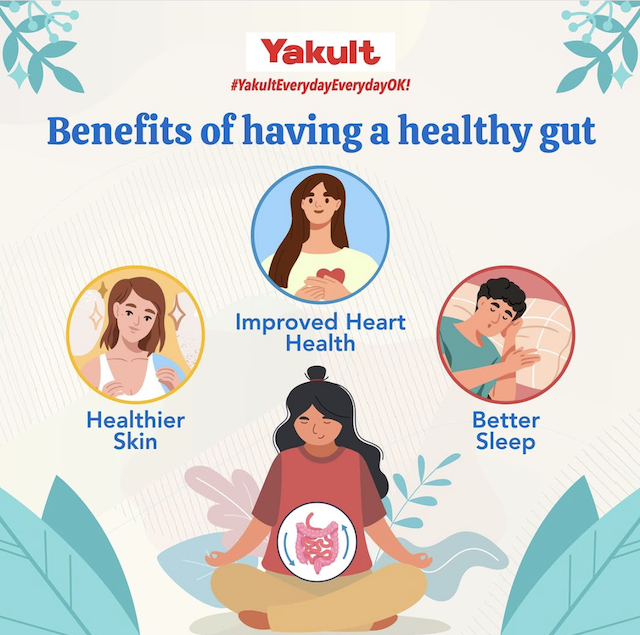Why Gut Health Matters – The gut is far more than just a digestive organ – it plays a vital role in overall health, impacting everything from immunity to mental well-being. In recent years, research has highlighted the gut-brain connection, revealing how gut bacteria influence mood, energy levels, and even cognitive function. As someone who leads a busy life, I was curious to see if improving my gut health would have noticeable benefits. With that in mind, my 18-year-old son and I embarked on a one-month experiment: drinking Yakult daily to see how probiotics might affect our digestion, energy, and general well-being.
My Yakult Journey: A Month of Probiotics
Day 1 – First Shot of Yakult (5 February 2025)
I’ve never been a fan of probiotic drinks, but Yakult’s new peach-flavoured version is surprisingly enjoyable – not too milky, and almost like a mid-morning treat. I don’t suffer from severe gut issues, but I do experience bloating and feel full quickly after meals. I was also feeling unusually lethargic throughout January – perhaps due to seasonal changes, stress, or lack of sunlight. Could improving my gut health help with my digestion and energy levels?
Midway Check-In (16 February 2025)
After 11 days, I noticed a slight improvement in digestion – my stomach felt less bloated, and I generally felt lighter. I wasn’t expecting major changes so soon, but it was encouraging.
Final Thoughts After a Month (20 March 2025)
A month into this experiment, I feel more energetic, my digestion has improved, and my skin looks healthier. Of course, I’ve also been mindful of my diet and managing stress at work, but I do believe Yakult played a role in keeping me on track. With high work pressure and seasonal flu around, I managed to stay well, which is a win in itself.
The Gut-Brain Connection: How Your Gut Affects Your Mood and Energy
Ever had a “gut feeling” about something? Expressions like “butterflies in your stomach” or “feeling gutted” exist for a reason – the gut and brain are directly connected. This bi-directional communication happens through the gut-brain axis, which links the enteric nervous system (the “second brain” in your gut) with the central nervous system via the vagus nerve.
How Stress Impacts Gut Health
When we’re stressed, our body releases cortisol, a hormone that can negatively affect gut bacteria. Prolonged stress may cause:
-
Inflammation in the gut (sometimes referred to as a “leaky gut”).
-
A reduction in beneficial gut bacteria.
-
Digestive symptoms such as bloating, heartburn, and stomach pain.
Research has shown that gut health is closely linked to mental well-being, and an imbalance in gut bacteria can contribute to anxiety and depression. This is why stress management techniques—such as mindfulness, yoga, and spending time outdoors—can support both gut and brain health.
Probiotics and Gut Health: How They Help
Probiotics are live bacteria that help maintain a healthy gut microbiome. A well-balanced gut microbiome supports digestion, immunity, and even hormone regulation. Fermented foods such as yoghurt, kefir, sauerkraut, and miso naturally contain probiotics, but supplements like Yakult offer an easy way to introduce beneficial bacteria into your diet.
The Science Behind Probiotics
Probiotic strains such as Lactobacillus casei Shirota (found in Yakult) have been shown to:
-
Support digestion by balancing gut bacteria.
-
Reduce bloating and digestive discomfort.
-
Enhance immune function.
-
Potentially improve mental well-being by influencing the gut-brain axis.
Diet, Lifestyle, and Gut Health
Foods That Support Gut Health
A healthy gut thrives on a diet rich in fibre, prebiotics, and probiotics. Here are some gut-friendly foods:
-
High-fibre foods: Whole grains (oats, brown rice, quinoa), legumes, and vegetables.
-
Fermented foods: Yoghurt, kefir, kimchi, miso, and sauerkraut.
-
Healthy fats: Walnuts, olive oil, and fatty fish like salmon.
-
Tryptophan-rich foods: Turkey, eggs, cheese, and nuts (helpful for serotonin production).
Exercise and Gut Health
Regular physical activity has been shown to promote a diverse gut microbiome. Exercise helps:
-
Reduce stress levels.
-
Improve digestion.
-
Boost mood and energy levels.
Even a simple daily walk outdoors can have significant benefits.
Gut Health and Menopause
Menopause brings hormonal changes that can affect gut health, including a decline in oestrogen levels, increased cortisol (stress hormone), and changes in gut microbiota composition. Symptoms like bloating and digestive discomfort are common, yet many women don’t realise the link between menopause and gut health.
Yakult’s 2024 Menopause Survey Findings:
-
46% of women aged 55-64 experience bloating.
-
34% report increased gas.
-
29% suffer from stomach discomfort.
-
Only 22% had tried eating more fermented foods to improve gut health.
How to Support Gut Health During Menopause:
-
Prioritise calcium-rich foods (dairy, leafy greens) to support bone health.
-
Increase omega-3 intake (fatty fish, walnuts) for heart and brain function.
-
Stay active with weight-bearing exercises.
-
Manage stress through mindfulness or gentle movement like yoga.
-
Improve sleep habits – poor sleep can negatively impact gut health.
With an estimated 1.2 billion menopausal and postmenopausal women by 2039, ongoing research into gut health’s role during menopause is crucial.
My Key Takeaways from This Experiment
After a month of daily Yakult, I feel more energetic, my digestion has improved, and my skin looks healthier. While probiotics alone aren’t a magic fix, they seem to complement a healthy lifestyle. Maintaining gut health is about balance – good nutrition, stress management, and listening to your body.
Would I continue drinking Yakult? Yes, I think it played a positive role, and it’s an easy way to support gut health. If you’re considering probiotics, it’s worth experimenting to see how your body responds. After all, as research shows, a happy gut can lead to a happier, healthier you.




